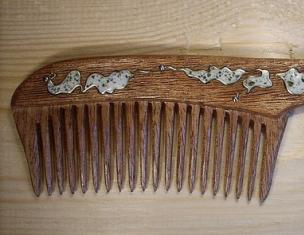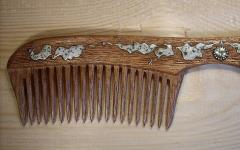Korchagina Matryona Timofeevna
WHO LIVES WELL IN Rus'
Poem (1863-1877, unfinished)
Matryona Timofeevna Korchagina is a peasant woman; the third part of the poem is entirely devoted to her life story. “Matryona Timofeevna / A dignified woman, / Broad and dense, / About thirty-eight years old. / Beautiful; gray hair, / Large, stern eyes, / Rich eyelashes, / Severe and dark. / She’s wearing a white shirt, / And a short sundress, / And a sickle over her shoulder”; The fame of the lucky woman brings strangers to her. M. agrees to “lay out her soul” when the men promise to help her in the harvest: the suffering is in full swing. M.'s fate was largely suggested to Nekrasov by the autobiography of the Olonets screamer I. A. Fedoseeva, published in the 1st volume of “Lamentations of the Northern Territory” collected by E. V. Barsov (1872). The narrative is based on her laments, as well as other folklore materials, including “Songs collected by P. N. Rybnikov” (1861). The abundance of folklore sources, often included practically unchanged in the text of “The Peasant Woman,” and the very title of this part of the poem emphasize the typicality of M.’s fate: this is the ordinary fate of a Russian woman, convincingly indicating that the wanderers “started / Not a matter between women / Look for a happy one." In his parents' house, in a good, non-drinking family, M. lived happily. But, having married Philip Korchagin, a stove maker, she ended up “by her maiden will in hell”: a superstitious mother-in-law, a drunken father-in-law, an older sister-in-law, for whom the daughter-in-law must work like a slave. However, she was lucky with her husband: only once did it come to beatings. But Philip only returns home from work in the winter, and the rest of the time there is no one to intercede for M. except grandfather Savely, father-in-law. She has to endure the harassment of Sitnikov, the master's manager, which stopped only with his death. For the peasant woman, her first-born Demushka becomes a consolation in all troubles, but due to Savely’s oversight, the child dies: he is eaten by pigs. An unjust trial is being carried out on a grief-stricken mother. Having not thought of giving a bribe to her boss in time, she witnesses the violation of her child’s body.
For a long time K. cannot forgive Savelya for his irreparable mistake. Over time, the peasant woman has new children, “there is no time / Neither to think nor to be sad.” The heroine's parents, Savely, die. Her eight-year-old son Fedot faces punishment for feeding someone else's sheep to a wolf, and his mother lies under the rod in his place. But the most difficult trials befall her in a lean year. Pregnant, with children, she herself is likened to a hungry wolf. The recruitment deprives her of her last protector, her husband (he is taken out of turn). In her delirium, she draws terrible pictures of the life of a soldier and soldiers’ children. She leaves the house and runs to the city, where she tries to get to the governor, and when the doorman lets her into the house for a bribe, she throws herself at the feet of the governor Elena Alexandrovna. With her husband and newborn Liodorushka, the heroine returns home, this incident secured her reputation as a lucky woman and the nickname “governor”. Her further fate is also full of troubles: one of her sons has already been taken into the army, “They were burned twice... God visited with anthrax... three times.” The “Woman’s Parable” sums up her tragic story: “The keys to women’s happiness, / From our free will / Abandoned, lost / From God himself!” Some of the critics (V.G. Avseenko, V.P. Burenin, N.F. Pavlov) met “The Peasant Woman” with hostility; Nekrasov was accused of implausible exaggerations, false, fake populism. However, even ill-wishers noted some successful episodes. There were also reviews of this chapter as the best part of the poem.
All characteristics in alphabetical order:
The image of the peasant woman Matryona Timofeevna. Nekrasov has many works where he reflects on the fate of ordinary women (“Troika”, “Frost, Red Nose”, “Orina, Mother of a Soldier”, “Knight for an Hour”, etc.). It is no coincidence that in the poem “Who Lives Well in Rus'” the central part of the narrative is devoted to one character - a Russian peasant woman.
Perhaps Nekrasov did not write about any peasant woman with such warmth and love as about Matryona Timofeevna. He gives the heroine the right to talk about the “happiness” that befell her. The heroine tells the wanderers about her life and invites them to draw their own conclusions about whether she can be called a happy person.
Matryona Timofeevna goes through all the trials that a Russian woman could go through. In her parents' house she lived freely and cheerfully, and after marriage she had to work like a slave and endure the reproaches of her husband's relatives. Her husband leaves to work, and Matryona is left completely alone in a family that is alien to her. My husband's visits bring me joy:
In winter Phillipushka came,
Brought a silk handkerchief
Yes, I went for a ride on a sled
On Catherine's day,
And it was as if there was no grief!..
Matryona is truly happy after the birth of her son Demushka. But then great grief befell her: her son dies. She took Demushka’s death hard. Then many misfortunes occur in her life: persecution of the master's manager, a hungry year, begging. It is no coincidence that Grandfather Savely speaks about the share of peasants:
There are three paths for men:
Tavern, prison and penal servitude,
And the women in Rus'
Three loops: white silk,
The second is red silk,
And the third - black silk,
Choose any!
But in difficult moments Matryona Timofeevna showed firmness and perseverance: she worked for the release of her husband, who was illegally taken as a soldier, and even went to the governor himself; snatched Fedotushka out when they decided to punish him with rods. Despite the tragic circumstances of her life, she managed to maintain dignity, nobility and rebellion. Her image exudes majesty. Her enormous energy, spiritual clarity, hard work, and vitality remained unchanged. Rebellious, determined, she is always ready to defend her rights, and this brings her closer to Savely. Matryona Timofeevna says about herself:
I have my head down
I carry an angry heart!..
For me, grievances are mortal
Gone unpaid...
Having told the wanderers about her difficult life, she says that “it’s not the case to look for a happy one among women!” In the last chapter, called “The Woman's Parable,” the peasant woman talks about the common female lot:
The keys to women's happiness,
From our free will
Abandoned, lost
From God himself.
But Nekrasov is sure that the “keys” must be found. The peasant woman will wait and achieve happiness. The poet speaks about this in one of Grisha Dobroskloyov’s songs:
You are still a slave in the family,
Search happy person they bring the wanderers of N. A. Nekrasov’s poem “Who Lives Well in Rus'” to the threshold of Matryona Timofeevna Korchagina’s house.
happy life
The chapter “Peasant Woman” is devoted to a description of the fate of Matryona Timofeevna. The governor's wife, as the peasants call her, joyfully recalls her childhood years, when she felt free, happy, and surrounded by care.
Subsequent events are a series of misfortunes. Married life is full of humiliation. A woman listens to the complaints of her mother-in-law, who considers her hardworking daughter-in-law “sleepy”, “drowsy”. Endures the shop's nagging and beatings from her husband. A happy event was the birth of Demushka’s son. But the joy was short-lived. Grandfather Savely fell asleep - the little boy died.
Having recovered, Matryona continues to sacrifice herself for the sake of loved ones. He lies down under the rod instead of Fedotushka’s son (the child took pity on the whelping wolf by feeding her a sheep). Saves her husband from service. Pregnant, in winter she goes to ask the governor for help. A woman’s happiness is overcoming the trials of fate.
The Old Woman's Parable
Men can't find it happy woman, says Matryona Timofeevna. The key to female happiness is “abandoned”, “lost”, says an old woman’s parable. The warriors of God found only the keys that make the peasant woman a slave.
In the works of N.A. Nekrasov’s many works are dedicated to a simple Russian woman. The fate of the Russian woman always worried Nekrasov. In many of his poems and poems, he talks about her difficult lot. Starting from the early poem “On the Road” and ending with the poem “Who Lives Well in Rus',” Nekrasov talked about “a woman’s share,” about the dedication of the Russian peasant woman, about her spiritual beauty. The poem “In full swing of the village suffering,” written shortly after the reform, gives a true reflection of the inhuman hard work of a young peasant mother:
Share you! - Russian female share!
It couldn't be more difficult to find...
Talking about the difficult lot of the Russian peasant woman, Nekrasov often embodied in her image high performances about the spiritual power of the Russian people, about their physical beauty:
There are women in Russian villages
With calm importance of faces,
With beautiful strength in movements,
With the gait, with the look of queens.
In Nekrasov’s works the image of a “majestic Slavic woman” appears, pure of heart, bright in mind, strong in spirit. This is Daria from the poem “Frost, Red Nose”, and simple girl from Troika. This is Matryona Timofeevna Korchagina from the poem “Who Lives Well in Rus'.”
The image of Matryona Timofeevna, as it were, completes and unites a group of images of peasant women in Nekrasov’s work. The poem recreates the type of “stately Slavic woman,” a peasant woman from Central Russia, endowed with restrained and austere beauty:
dignified woman,
Wide and dense
About thirty-eight years old.
Beautiful; gray hair
The eyes are large, stern,
The richest eyelashes,
Severe and dark.
The poet trusted her, smart and strong, to tell her about her fate. “Peasant Woman” is the only part of the poem “Who Lives Well in Rus'”, all written in the first person. Trying to answer the question of truth-seekers about whether she can call herself happy, Matryona Timofeevna tells the story of her life. The voice of Matryona Timofeevna is the voice of the people themselves. That’s why she sings more often than she talks, she sings folk songs. “The Peasant Woman” is the most folklore part of the poem; it is almost entirely built on folk poetic images and motifs. The whole life story of Matryona Timofeevna is a chain of continuous misfortunes and suffering. No wonder she says about herself: “I have a bowed head, I carry an angry heart!” She is convinced: “It’s not a matter of looking for a happy woman among women.” Why? After all, in this woman’s life there was love, the joy of motherhood, and the respect of others. But with her story, the heroine makes men think about the question of whether this is enough for happiness and whether this cup will not be outweighed by all those life’s hardships and adversities that befall the Russian peasant woman:
For me it is quiet, invisible,
The spiritual storm has passed,
Will you show it?..
For me, grievances are mortal
Gone unpaid
And the whip passed over me!
Matryona Timofeevna tells her story slowly and deliberately. She lived well and freely in her parents' house. But, having married Philip Korchagin, she ended up with “her maiden will in hell”: a superstitious mother-in-law, a drunken father-in-law, an older sister-in-law, for whom the daughter-in-law had to work like a slave. She was, however, lucky with her husband. But Philip only returned from work in the winter, and the rest of the time there was no one to intercede for her except grandfather Savely. Her first-born Demushka becomes a consolation for the peasant woman. But due to Savely’s oversight, the child dies. Matryona Timofeevna witnesses the abuse of her child's body (to find out the cause of death, the authorities perform an autopsy on the child's corpse). For a long time she cannot forgive Savely’s “sin” that he overlooked her Demushka. But Matryona Timofeevna’s trials did not end there. Her second son Fedot is growing up, and then a misfortune happens to him. Her eight-year-old son faces punishment for feeding someone else's sheep to a hungry wolf as a shepherd. Fedot took pity on her, saw how hungry and unhappy she was, and how the wolf cubs in her den were not fed:
He looks up, raising his head,
In my eyes... and suddenly she howled!
In order to save her little son from the punishment that threatened him, Matryona herself lies down under the rod in his place.
But the most difficult trials befall her in a lean year. Pregnant, with children, she herself is likened to a hungry wolf. The recruitment deprives her of her last protector, her husband (he is taken out of turn):
...Hungry
Orphan children are standing
In front of me...Unkind
The family is looking at them
They are noisy in the house
There are pugnacious people on the street,
Gluttons at the table...
And they began to pinch them,
Beat on the head...
Shut up, soldier mother!
Matryona Timofeevna decides to ask the governor for intercession. She runs to the city, where she tries to get to the governor, and when the doorman lets her into the house for a bribe, she throws herself at the feet of the governor Elena Alexandrovna:
How will I throw myself
At her feet: “Intercede!
By deception, not in God's way
breadwinner and parent
They take it from the kids!”
The governor's wife took pity on Matryona Timofeevna. The heroine returns home with her husband and newborn Liodorushka. This incident secured her reputation as a lucky woman and the nickname “governor”.
The further fate of Matryona Timofeevna is also full of troubles: one of her sons has already been taken into the army, “they were burned twice... God visited with anthrax... three times.” The “Woman’s Parable” sums up her tragic story:
The keys to women's happiness,
From our free will
Abandoned, lost
From God himself!
The life story of Matryona Timofeevna showed that the most difficult, unbearable living conditions could not break the peasant woman. Harsh living conditions honed a special female character, proud and independent, accustomed to relying on everything everywhere and in everything. own strength. Nekrasov endows his heroine not only with beauty, but with great spiritual strength. It is not submission to fate, not dull patience, but pain and anger that are expressed in the words with which she ends the story of her life:
For me, grievances are mortal
Gone unpaid...
Anger accumulates in the soul of the peasant woman, but faith in the intercession of the Mother of God and in the power of prayer remains. After praying, she goes to the city to the governor to seek the truth. What saves her is her own spiritual strength and will to live. Nekrasov showed in the image of Matryona Timofeevna both a readiness for self-sacrifice when she stood up to defend her son, and strength of character when she did not bow to formidable bosses. The image of Matryona Timofeevna is entirely woven from folk poetry. Lyrical and wedding folk songs and laments have long told about the life of a peasant woman, and Nekrasov drew from this source, creating the image of his beloved heroine.
Written about the people and for the people, the poem “Who Lives Well in Rus'” is close to the works of oral folk art. The verse of the poem - Nekrasov's artistic discovery - perfectly conveyed the living speech of the people, their songs, sayings, sayings, which absorbed centuries-old wisdom, sly humor, sadness and joy. The whole poem is a truly folk work, and this is its great significance.
Most of Nekrasov’s poem “Who Lives Well in Rus'” entitled “Peasant Woman” is dedicated to Russian women. Wanderers, looking for a happy person among men, in this part of the work decided to turn to another woman, and on the advice of the residents of one of the villages, they turned to Matryona Korchagina.
This woman’s confession captivated them with the directness and depth of her story about her years. To do this, the author used metaphors, similes, folk songs and lamentations in the heroine’s story. All this from Matryona’s lips sounds sad and sad. But is she happy and what is the story of her life?
Matryona's childhood was cloudless. She was born into a good, hardworking peasant family where there was no discord. Her parents loved and took care of her. Having matured early, she began to help them in everything, working hard, but still finding time for rest.
She also remembered her youth with warmth, because she was beautiful and energetic and managed to do everything: work and relax. Many guys looked at Matryona until the betrothed was found to whom she was married off. The mother, mourning her daughter, lamented that marriage, in a foreign country and in a strange family, would not be a happy life for her. But such is a woman’s lot.
That's exactly what happened. Matryona ended up in a large, unfriendly family, following her words “from the maiden holiday to hell.” They didn’t like her there, they forced her to work hard, they insulted her, and her husband often beat her, because in those days beating women was commonplace. But Matryona, having a strong character, courageously and patiently endured all the hardships of her forced life. And even in these difficult life circumstances, she knew how to be happy. Her husband will bring a scarf as a gift and take her for a ride on a sleigh - and she rejoices at these moments.
The greatest happiness for Matryona was the birth of her first child. That's when she was truly happy. But this happiness was short-lived. Due to the old man's oversight, the child dies, and the mother is blamed for everything. Where did she get the strength to survive all this? But she survived, as she also experienced a lot of grief and humiliation.
In her difficult peasant life, she proudly fights and does not fall into despair. Every year she gives birth to children, giving them all her love. She resolutely stands up for her son and takes on his punishment; she boldly goes to ask for her husband so that he is not taken to war. Left an orphan at the age of 20, she has no one to rely on and no one to feel sorry for her. So courage and perseverance developed in her character.
Two fires, epidemics, famine and other misfortunes befell her hard lot. But one can only envy the firmness and fortitude of this Russian woman. Even when her mother-in-law died and Matryona became the mistress, life did not become easier for her, but she stubbornly fought for survival and she won.
This is the story of Matryona’s life. This is how they, Russian women, were once in Rus'!
Several interesting essays
- Essay My favorite Russian film
The decadent state of Russian cinema is no secret to anyone. It is inferior to foreign ones both in the quality of implementation and in the choice of material for filming. There is a bad tendency to imitate bad foreign films
- Heroes of Dostoevsky's White Nights
The main characters of the work are
- Essay on a story by Raduga Bakhmutova
Every person has memories from childhood. Some events blur into a blur, others leave vivid impressions, remembered with the smallest details and details. And along with the event, every emotion experienced at that moment is remembered.
But there are many worthy people on our planet who can be called ideal. These are those who save people’s lives every day: doctors, firefighters, rescuers
What will the education system of the future be like? In my opinion, it will be global. Any student will be able to receive a quality education no matter where he lives.








